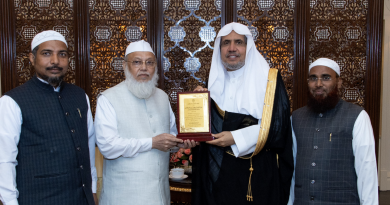Al-Maliki and Sadr: A Kingmaker spells the end of a Kleptocrat
Sadr is gaining popularity, engaging more with the public, and solidifying his grass-roots movement.
The situation in Iraq is worsening. Tensions have been simmering over the past months. Infighting has been the hallmark of the political process. After the elections, where the Sadrists captured 73 seats but failed to form the government, deadlock has prevailed. Moqtada al-Sadr, a firebrand Shiite leader with nationalist and anti-Iran leanings, refuses to hand over the country to pro-Iran politicians, citing devastating corruption, rife sectarianism and chronic failure.
Eight months of consultations and back-and-forth talks have failed to produce a government. Al-Sadr ordered his aligned lawmakers to resign from the new parliament, throwing the political landscape into uncharted waters. Furthermore, leaks have recently emerged where former Prime Minister Nouri Al-Maliki was heard insulting Sadr, Kurds and the Sunnis. He mentioned the role of Iran; blamed the Popular Mobilization Forces’ (PMF) leaders and vowed to finish off the Zionist Sadr.
These leaks have rattled the Iraqi political landscape. According to observers, they have exposed Maliki’s true face and the schemes he is plotting against Iraq in general and Sadr in particular. They viewed them as worrying. By contrast, others said that these leaks are a boon and a gift to Sadr and his camp. They will help him further isolate Maliki and put more pressure on him to drop out of the political process in its entirety.
The 48-minute long leaks put Sadr against Al-Maliki and bring the power play between them to its last stage. It’s the endgame. Until recently, the dispute has been partly above the table and partly under it. Now, the dispute is wholly above the table. Moreover, Sadr is at his highest point, while Al-Maliki is at the lowest.
The political history of both Shiite figures paints a clear picture of the current standoff. The way Al-Sadr began his journey in the Iraqi political arena is a far cry from the way he is pursuing now. Meanwhile, Al-Maliki has been sticking to the same agenda, whose key pillars are sectarianism and favoring Iran’s interests and ideological ascendancy over Iraq’s.
Under his rule, Iraq had nearly swum in a bloodbath, with killings on sectarian grounds becoming a commonplace. In addition to corruption and sectarianism, Maliki ended his rule with the worst scandal that could face any leader in the world: Losing territory of the country he rules to an extremist bloodthirsty group. On the other side, Al-Sadr, who engaged in cutthroat armed conflicts against Al-Maliki and the US forces before dismantling his Al-Mahdi Army, made several revisions, switched alliances and persuasions and ended up embracing Islamic nationalism over the globalist version adopted by his rivals receiving generous support from Iran.
He also spoke up against corruptions, staged million-man marches and spearheaded anti-government protests, becoming Iraq’s most powerful political actor and even its kingmaker.
But there’s something that added more complexities to the already complicated political landscape in Iraq. Leaks have emerged where former Iraqi prime minister was heard insulting nearly all Iraqi political actors—even within his own alliance. The leaks that were made public by Iraqi activist overseas Ali Fadel threw the entire Iraqi political landscape into confusion.
Al-Sadr insisted the leaks were correct, asking Al-Maliki to withdraw entirely from the political scene and turn himself up to the judiciary along with the bunch of corrupt leaders protecting him. According to observers, MalikiLeaks represented the climax of the dispute between the two main forces in Iraq now: Those who want to keep the country a pawn to Iran and a follower of its ideological vision of government and those who want to build a civilian nationalist government—on Islamic grounds. But these leaks weren’t the beginning of the tragedy of Iraq’s current tragedy.
Al-Maliki is the root of all evils in the post-2003 Iraq. He is a kleptocrat. His rule was marked by corruption, and many corruption cases were exposed after he left office. His financial scandals and corruption is so extensive that it could be hard to enumerate. But here are some instances:
- Maliki’s government had spent the billions of dollars on arms deals—that were actually either nonexistent or as aging as World War II.
- There had also been hefty bribes in millions of dollars paid to officials in the ministry of defense. This easily explains why the Iraqi army failed to repel the ISIS militants who seized control of one-third of the country in 2014, announcing the so-called caliphate from Iraq’s city of Mosul.
- Al-Maliki’s government allocated $1 billion to construct a phantom military hospital. Investigations have revealed that there’s no such a hospital in the country and even ‘the foundation stone hasn’t been laid’.
- Ahmad, Maliki’s son is reported to have transferred $1.5 billion from Iraq to Lebanon during the reign of his father.
In addition to corruption, Al-Maliki’s rule had been marked by scandals. One of those scandals surfaced when six ministers and 53 government officials fled the country. Iraqi president Fuad Masum was asked to use his personal relationships to ask countries to repatriate those officials. Among those ministers are former trade minister Falah al-Soudani, also a leader within Dawa Party, former defense minister Abdel-Qader Al-Obeidi and former electricity minister Karim Wahid. All the ministers sporadically fled the country under Al-Maliki.
Maliki’s policies have fueled anger among Iraqis, especially the Sunnis. According to the leaks, Al-Maliki views the Sunnis as forces of evil who want to hijack the country in collaboration with Sadr and the Kurds. But history suggests otherwise. The Sunnis have suffered unspeakable grievances under Maliki. In late 2012, Iraqi Sunnis staged months-long protests against the marginalization against them by the Shiite-dominated government. In July 2013, violence dangerously escalated, with the country becoming on the verge of civil war. After a few months, ISIS overran Mosul and declared the so-called caliphate. Al-Maliki was forced to resign from his post after plunging the country into the unknown.
In the same vein, Al-Sadr had launched his own anti-corruption drive. Since 2016, the Shiite cleric and his supporters have been staging anti-corruption protests. As days passed by, the protests gained momentum. In 2019, protests renewed, growing bigger and leading to the ouster of the then prime minister Adel Abdul Mahdi. This sway on the street translated to electoral gains, with the Iraqi mood drifting significantly towards the Sadr bloc in the 2018 and 2021 elections.
A quick comparison of the results of the 2018 Iraqi parliamentary elections with the results of the 2021 elections is instructive. Sadr’s Sairoon bloc captured 54 seats in 2018, while the Fatah Alliance, led by Hadi al-Ameri, and the State of Law Coalition, led by former Prime Minister Nouri Al-Maliki, received 73. Sadr captured 73 seats in 2021, which was equal to the number of seats captured by both pro-Iran alliances combined in 2018, while these factions, united around the Coordination Framework, captured 51 seats, which was less than what Sadr captured alone in the 2018 election. This dramatic shift in Sadr’s favor is not unjustified.
Sadr is gaining popularity, engaging more with the public, and solidifying his grass-roots movement. In contrast to the extraterritorial, transnational agenda embraced by Iran-backed forces in the country, he is pursuing a nationalist, inward-looking agenda. Pro-Iran forces, on the other hand, are becoming increasingly bankrupt. They have absolutely nothing to offer the Iraqis. Iraqis have been devastated by decades of corrupt rule, kleptocracy, sectarianism, and complacency in the face of terrorism. The oil-rich country is teeming with poor, destitute, and displaced people who have suffered at the hands of both Sunni and Shiite militants.
Hence, we see a Sadrist rise versus a decline of Al-Maliki and the camp he represents. The Sadrist rise is deserved. The firebrand Shite cleric has switched persuasions over the years as well as alliances. He aligned himself with Iran, and then he broke up the alliance. It has grown stronger on the Iraqi landscape over the years, attracting more supporters and voters among Iraqis. The movement began its journey on the Iraqi landscape through militancy, leading the Mahdi Army in fierce resistance against US forces in the country. Sadr then began to shift, becoming a more nationalist, moderate Shiite, and rational politician. He got involved in politics, toned down his rhetoric, and started winning seats in parliament.
While Al-Sadr has become more patriotic and nationalist, Al-Maliki has become more sectarian and Iran loyal. Al-Maliki reveals his true face in the leaked audio recording. He talks about the Iranian support he has, the militias he plans to form, and the enemies he plans to eliminate (the Sadrists, Sunnis and Kurds). This audio recording paints a bleak picture of Iraq and its future under Maliki and his supporters. However, it is the true face of this political class, with no whitewashing.
The current battle between Al-Sadr and Al-Maliki is an endgame. It will likely be the end of Iran’s version of political Islam in Iraq. At the national level, it will mark a triumph of patriotic localism over unpatriotic globalism. Ideologically, it’s a battle petting all the unpatriotic and irrational figures in the country infused with blind sectarianism against the patriotic figures infused with nothing but patriotism and the desire to rid Iraq of the current quagmire. It’s an endgame that will decide the fate of the Iranian version of Shiite political Islam. This line is on the decline. It has died for the first time when ISIS extremists took control of one-third of Iraq while Maliki was the prime minister. There’s now an attempt to revive it through Maliki and his plotted coup against the entire political process. But Iraq’s most powerful politician stands in the way. Indeed, this battle will likely spell the death of Iraq’s longtime kleptocrat and declare the birth of its kingmaker.
Mostapha Hassan Abdelwahab is the former editorial manager of the English edition of the Baghdad Post. He is focusing on Iraqi and Iranian affairs, with articles posted on the Herald Report, Vocal Europe and other platforms.



